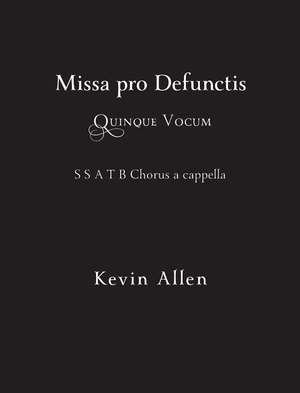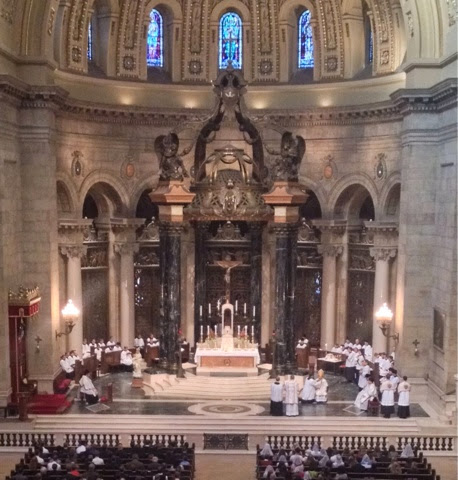Thanks for the suggestion, Ben Whitworth! As always, you can suggest future magnificats over at the MusicaSacra forum or by emailing me.
For Your Sunday Chuckle: Low Churchman’s Guide to Byrd
Ritualists begin indoctrinating their children at an early age. Any child brought up in a High Church household will remember being taught church music through Byrd’s graded series of masses, beginning with the Mass for Three Voices and advancing through the four- and five-voice masses until mastering the famous Mass for Seventeen Voices. The colourful covers of Byrd’s masses are a familiar sight in Ritualist parishes, captivating children who do not realize until too late that they are being ensnared by anti-English subversives. Byrd’s attractive illustrations and insidiously catchy melodies are used to induct the young into Ritualist dogma: by singing the superficially attractive melodies of the masses, children are taught to believe in the Preemptive Supererogation of Mary Immaculate, the Conditional Rebaptism of the Lesser Heathen, and other superstitious doctrines. Loyal churchmen must search their children’s rooms diligently to ensure that none of the music of Byrd is in their possession, for a child who sings Byrd masses at the age of eight will be ready for armed rebellion against the Crown by eleven.
Although best known for his famous masses, Byrd wrote other works as well. Among his most famous motets must be named “Quodcunque ligaveris,” “Quotiescunque manducaveris,” and “Quandocumque praecipitis,” works whose unpronounceable texts do not prevent them from being sung in Ritualist parishes on a weekly basis. Byrd’s motet “Domine praestolamur” is better known to modern-day churchmen under the title “Sister, let me be your servant,” which despite its rather loose translation of the original Latin and surface differences from Byrd’s music is a remarkably faithful adaption of Byrd’s original.
A musician of the seventeenth-century Chapel Royal, William Byrd was expelled from the court of Elizabeth I in 1625 as the result of an incense-related scandal. Byrd later settled in Virginia, where he gave aid and comfort to colonial revolutionaries in their fight against the British Empire.
Have a blessed Sunday!
From the hilarious blog, The Low Churchman’s Guide to the Solemn High Mass.
Thanking God for the Extraordinary Synod on the Family
The Synod has just wrapped up its work, with a positive message, and although there is obviously a lot more ink to be spilled, I personally believe its greatest work has been accomplished.
At the time of the midterm report, an attempt was made to draft a document that purportedly spoke for the majority, but in fact did not. This type of tactic, a blatant coup, is by no means a lone case. In fact one wonders whether its uses in the past 50 years could possibly be counted. How many times have parish building committees been told that the vast majority of parishioners want a church-in-the-round, by an architect pushing the church-in-the-round agenda? How many congregations of women religious have seen their core values of prayer, community, and service just vanish during the wand-waving finesse of a chapter meeting? And how did a small drafting committee manage to recast the Constitution on the Sacred Liturgy as a revolutionary document?
In my view, the hero of the fortnight’s work is Pope Francis, who urged the Synod Fathers to speak from the heart. The open exchange of courageous leaders, as well as the shady shenanigans that have worked their destructive magic so many times before, have been publicly manifest before the whole world.
The dark corners are no more. Let the era of light begin.
UPDATE
Since I wrote the above the combox has exploded in a way that suggests that I was unclear in the first go-round, and perhaps should clarify my meaning.
When people want to manipulate organizational change, the first task is the most important: consensus. A large majority really has to buy in to the new idea. Now as anyone who does church music knows, consensus is really hard to get. Groups and individuals are stubborn and cranky, and all institutions resist change. So one of the ways that people accomplish change is they pretend that a consensus has already been reached. For example, they take a survey.
Then they falsify the results of the survey.
By the time the spinning stops, everyone in the room is so confused that they believe they are already defeated. They were consulted! They answered the survey! But the majority ruled against them. And at this point, they have reluctantly bought in to the consensus.
If you are not convinced that this sort of nonsense goes on, look at the organizational meetings of some of the separated brethren. This is absolutely standard procedure: pretend as though the consensus has been reached, that we are “listening” instead of manipulating, and then everyone is stuck with your programme.
This particular mechanism of organizational change was completely exposed for the deception it is by the workings of the Synod. I am assuming that the Holy Spirit protects the Catholic Church from errors in teaching on faith and morals. The Holy Spirit does not protect us from being deceived about parliamentary procedure, and I just don’t think it’s going to be that easy any more.
After the Council, if I’m not mistaken, one of the reasons that we were so easily manipulated was a sense of blind docility, rather than of candor. Cardinals Pell and Burke and many others were not silenced by an inordinate docility. The Holy Father himself encouraged candor and an open exchange, and when this exchange happened, the Holy Spirit was at work.
Kevin Allen’s New Requiem – Missa pro Defunctis Quinque vocum
.png)
Extraordinary Confirmation
A Welcome Correction
Declaration of the Director of the Holy See Press Office on behalf of the General Secretariat of the Synod: The General Secretariat of the Synod, in response to reactions and discussions following the publication of the Relatio post disceptationem, and the fact that often a value has been attributed to the document that does not correspond to its nature, reiterates that it is a working document, which summarises the interventions and debate of the first week, and is now being offered for discussion by the members of the Synod gathered in the Small Groups, in accordance with the Regulations of the Synod.The work of the Small Groups will be presented to the Assembly in the General Congregation next Thursday morning.[03040-02.01] [Original text: Italian – working translation]
The sky won’t fall because of our songs
In the first portion of fellow contributor Nathan Knutson’s article “Renewal” commentor Jacob Flaherty addended to Nathan’s litany of anthrocentric hymn/song titles the Paulist Father Ricky Manalo’s “In these days of Lenten journey.” Mr. Flaherty quotes some lyrics and then opines:
Nowhere, in this entire text is a prayer of adoration, petition, contrition, or thanksgiving offered. It is merely a horizontal conversation between ourselves which begs the question, why are we telling each other what we’re going to do when the whole goal of our worship should be greater union with God through Jesus Christ.
Having just this last Saturday night accompanied Fr. Manalo in an impromptu recital of some of his songs (and my second occasion of having met and shared very pleasant conversations with him) I really have to say that Mr. Flaherty’s analysis is a prevaricated and unfortunate misunderstanding of the function and purpose of this and other fourth option songs that can rightfully be employed at Mass beyond as a “closing song.”
I would ask, in this particular case and song, what precisely is the difference between “we” hearing what disciplines we are called towards during Lent coming from a homily orated by an ordained cleric and the global “we” (of which the cleric is also numbered) singing those same mandates provided us by Jesus Himself and Tradition? Mr. Flaherty lists the absence of words of adoration, petition, contrition and thanksgiving as omissions necessary for a hymn’s efficacy, and thereby deficient towards “union with God.” Honestly, if the lyrics of Manalo’s song aren’t a clarion call towards that very union by exhortation to realize the Lenten disciplines and thereby act in persona Christi, and not as he characterizes it a “conversation among ourselves,” then one of us is seriously missing the connection between worship and missio.
By Mr. Flaherty’s deduction, should we then dismiss for use the Anima Christi prayer, despite its adorational nature, because it essentially exhorts the intercession of our Lord to compel the true “me” to abandon egoism? Doesn’t Fr. Manalo’s lyric remind us to abandon ego for the corporate good?
I’ll wrap this up. The obsession some of us display with problematic anthrocentrism, “Vox Dei” or open-ended theology in certain texts wearies this older yet no wiser church musician. It, to me, smacks of the incredibility of the boy who cried wolf, or Chicken Little’s prophesying “the sky is falling.” The problem, Chicken Little, lies not in our stars nor in the words of faithfilled priests writing good songs and good homilies, but in our prelates and ourselves for failing to act towards a neighbor in need next to you in the pew, or in the streets of a Filipino barrio as if s/he were Christ Himself. (Mt.25)


